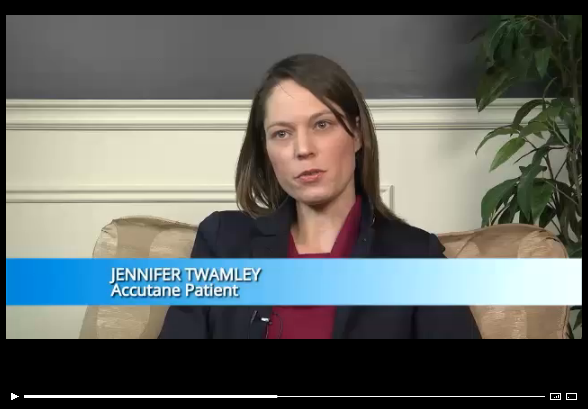Two Ontario law firms are putting a face to a mass tort case and using
video to get the word out to others who may have been affected by an acne medication prescribed to many since the early 1980s.

An $8-million lawsuit has been launched against Hoffman-La Roche Ltd., the makers of Accutane, on behalf of Jennifer Twamley who was prescribed the drug at age 17 to control her acne. She now suffers from ulcerative colitis, an inflammatory bowel disease, which lawyers from Legate & Associates LLP and Harrison Pensa LLP say is a side effect of Accutane. The lawyers say Canadians weren’t warned about the drug’s potentially dangerous side effects. Studies in the United States have found Accutane is linked to inflammatory bowel disease.
Twamley, 33, a television producer, is suing Hoffmann-La Roche in a mass tort, one of the first in Canada involving the acne drug. The lawsuit was filed in the Ontario Superior Court of Justice.
A mass tort is a group of lawsuits involving individuals who share similar complaints as a result of their experiences with a drug or defective product. As Accutane affects each person differently, the harm suffered varies widely. By bringing a mass tort, versus a class action, the lawyers say the victims are well served as their medical damages can be assessed on an individual basis.
Mass torts are common in the United States, where Roche has already been successfully sued for millions of dollars in connection with the manufacture and sale of Accutane. Roche stopped selling Accutane in the United States in 2009 for business reasons, but the drug is still sold in Canada.
The Twamley case is being put forward as a test case for more than a dozen similar ones the lawyers are preparing to file against the company.
As demographics and means of communication evolve, how law firms get the word out about such cases is changing, says Dave Williams of Harrison Pensa.
“For a standalone single case this is a first for me,” says Williams. “I think it’s just a changed world. The other aspect of this is the demographic — the people who took this drug as teenagers and have the problems with IBD as early adults just communicate differently.”
In the past mass actions like the Accutane case were heard about largely via word of mouth. To date, some individuals have found out about the action by using search engines when researching the drug or their own symptoms.
“In this day and age it just doesn’t work that way,” says Williams. “Certainly thus far the communication has been through the
web site and we’ve had well over 125 serious contacts that way. We follow up with each and every one and do a detailed briefing as if they’d walked in the office. It’s just a modern way of dealing with potential clients than we had before,” says Williams.

 An $8-million lawsuit has been launched against Hoffman-La Roche Ltd., the makers of Accutane, on behalf of Jennifer Twamley who was prescribed the drug at age 17 to control her acne. She now suffers from ulcerative colitis, an inflammatory bowel disease, which lawyers from Legate & Associates LLP and Harrison Pensa LLP say is a side effect of Accutane. The lawyers say Canadians weren’t warned about the drug’s potentially dangerous side effects. Studies in the United States have found Accutane is linked to inflammatory bowel disease.
An $8-million lawsuit has been launched against Hoffman-La Roche Ltd., the makers of Accutane, on behalf of Jennifer Twamley who was prescribed the drug at age 17 to control her acne. She now suffers from ulcerative colitis, an inflammatory bowel disease, which lawyers from Legate & Associates LLP and Harrison Pensa LLP say is a side effect of Accutane. The lawyers say Canadians weren’t warned about the drug’s potentially dangerous side effects. Studies in the United States have found Accutane is linked to inflammatory bowel disease.